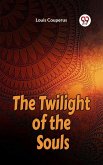In 'The Twilight of the Souls,' Louis Couperus delivers a poignant exploration of existentialism and psychological introspection set against the backdrop of turn-of-the-century Dutch society. Through lyrical prose and intricate characterizations, Couperus weaves a narrative that delves into the complexities of human emotion, spiritual contemplation, and the inevitable passage of time. The book captures a period of profound change, aligning with the themes of modernism that emerged in the late 19th and early 20th centuries, reflecting the author's keen insight into the human condition and the dilemmas of modern life. Louis Couperus, a prominent figure in Dutch literature, is known for his ability to reflect not only the societal shifts of his time but also the intricate workings of the human psyche. His diverse background, blending influences from various artistic and philosophical movements, informed his writing style, which often examines the layers of consciousness and the conflicts between individual desires and societal expectations. This unique perspective enriches 'The Twilight of the Souls,' allowing Couperus to explore nuanced themes of decay and renewal. For readers seeking a profound literary experience, 'The Twilight of the Souls' stands as an essential work that invites introspection and contemplation. Couperus's masterful ability to intertwine the philosophical with the poetic renders this novel a timeless exploration of the human soul, making it a must-read for those interested in existential themes and the intricacies of life's twilight.
Dieser Download kann aus rechtlichen Gründen nur mit Rechnungsadresse in A, B, BG, CY, CZ, D, DK, EW, E, FIN, F, GR, H, IRL, I, LT, L, LR, M, NL, PL, P, R, S, SLO, SK ausgeliefert werden.
Hinweis: Dieser Artikel kann nur an eine deutsche Lieferadresse ausgeliefert werden.









